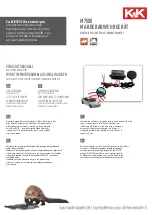
Rockwell Automation Publication ICSTT-RM448J-EN-P - April 2018
165
Glossary
P
peer to peer
A Peer to Peer network consists of one or more Ethernet networks connecting
together a series of AADvance and/or Trusted controllers to enable application
data to be passed between them.
pinging
In MODBUS communications, sending the diagnostic Query Data command
over a link and by receiving a reply ensuring that the link is healthy and the
controller is able to communicate with the master. No process data is
transferred or modified. In the case of slave devices that will not support
pinging then the Standby command will default to Inactive state, but no error
will be returned.
portable equipment
Enclosed equipment that is moved while in operation or which can easily be
moved from one place to another while connected to the supply. Examples are
programming and debugging tools and test equipment.
process safety time (PST)
For equipment under control this represents the period of time a dangerous
condition can exist without the protection of a safety instrumented system
before a hazardous event occurs.
processor base unit
A backplane assembly which holds all of the processor modules in an
AADvance controller. Part number 9100. See also 'processor module'.
processor module
The application execution engine of the AADvance controller, housed in a self-
contained and standardized physical form factor.
producer
A controller producing a tag to one or more consumers, at the request of the
consumers.
program enable key
A security device that protects the application from unauthorized access and
change, in the form factor of a 9-way 'D' type plug. Part number 9906.
Supplied with the processor base unit. See also 'key connector'.
project
A collection of configurations and the definition of the linking between them.
See 'configuration'.
proof test
A test performed at a predetermined frequency which functionally tests all of
the components that comprise a Safety Instrumented Function, designed
specifically to reveal any undetected failures that may exist so that they can be
repaired to ensure that the Safety Instrumented Function continues to meet its
designed performance criteria over the entire safety life cycle.
protocol
A set of rules that is used by devices (such as AADvance controllers, serial
devices and engineering workstations) to communicate with each other. The
rules encompass electrical parameters, data representation, signalling,
authentication, and error detection. Examples include MODBUS, TCP and
IP.





































